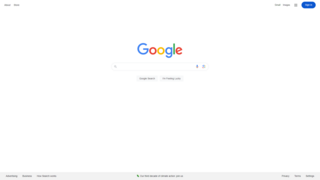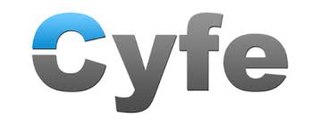
Google Search is a search engine operated by Google. It allows users to search for information on the Internet by entering keywords or phrases. Google Search uses algorithms to analyze and rank websites based on their relevance to the search query. It is the most popular search engine worldwide.
Search engine optimization (SEO) is the process of improving the quality and quantity of website traffic to a website or a web page from search engines. SEO targets unpaid traffic rather than direct traffic or paid traffic. Unpaid traffic may originate from different kinds of searches, including image search, video search, academic search, news search, and industry-specific vertical search engines.

The terms Google bombing and Googlewashing refer to the practice of causing a website to rank highly in web search engine results for irrelevant, unrelated or off-topic search terms by linking heavily. In contrast, search engine optimization (SEO) is the practice of improving the search engine listings of web pages for relevant search terms.
A backlink is a link from some other website to that web resource. A web resource may be a website, web page, or web directory.
Online advertising, also known as online marketing, Internet advertising, digital advertising or web advertising, is a form of marketing and advertising that uses the Internet to promote products and services to audiences and platform users. Online advertising includes email marketing, search engine marketing (SEM), social media marketing, many types of display advertising, and mobile advertising. Advertisements are increasingly being delivered via automated software systems operating across multiple websites, media services and platforms, known as programmatic advertising.
Search engine marketing (SEM) is a form of Internet marketing that involves the promotion of websites by increasing their visibility in search engine results pages (SERPs) primarily through paid advertising. SEM may incorporate search engine optimization (SEO), which adjusts or rewrites website content and site architecture to achieve a higher ranking in search engine results pages to enhance pay per click (PPC) listings and increase the Call to action (CTA) on the website.
In web search engines, organic search results are the query results which are calculated strictly algorithmically, and not affected by advertiser payments. They are distinguished from various kinds of sponsored results, whether they are explicit pay per click advertisements, shopping results, or other results where the search engine is paid either for showing the result, or for clicks on the result.
The Sandbox effect is a theory about the way Google ranks web pages in its index. It is the subject of much debate—its existence has been written about since 2004, but not confirmed, with several statements to the contrary.

Digital marketing is the component of marketing that uses the Internet and online-based digital technologies such as desktop computers, mobile phones, and other digital media and platforms to promote products and services. Its development during the 1990s and 2000s changed the way brands and businesses use technology for marketing. As digital platforms became increasingly incorporated into marketing plans and everyday life, and as people increasingly used digital devices instead of visiting physical shops, digital marketing campaigns have become prevalent, employing combinations of search engine optimization (SEO), search engine marketing (SEM), content marketing, influencer marketing, content automation, campaign marketing, data-driven marketing, e-commerce marketing, social media marketing, social media optimization, e-mail direct marketing, display advertising, e-books, and optical disks and games have become commonplace. Digital marketing extends to non-Internet channels that provide digital media, such as television, mobile phones, callbacks, and on-hold mobile ringtones. The extension to non-Internet channels differentiates digital marketing from online marketing.
Google Search Console is a web service by Google which allows webmasters to check indexing status, search queries, crawling errors and optimize visibility of their websites.

In geomarketing and internet marketing, geotargeting is the method of delivering different content to visitors based on their geolocation. This includes country, region/state, city, metro code/zip code, organization, IP address, ISP, or other criteria. A common usage of geotargeting is found in online advertising, as well as internet television with sites such as iPlayer and Hulu. In these circumstances, content is often restricted to users geolocated in specific countries; this approach serves as a means of implementing digital rights management. Use of proxy servers and virtual private networks may give a false location.
In the field of search engine optimization (SEO), link building describes actions aimed at increasing the number and quality of inbound links to a webpage with the goal of increasing the search engine rankings of that page or website. Briefly, link building is the process of establishing relevant hyperlinks to a website from external sites. Link building can increase the number of high-quality links pointing to a website, in turn increasing the likelihood of the website ranking highly in search engine results. Link building is also a proven marketing tactic for increasing brand awareness.
Social network advertising, also known as "social media targeting," is a group of terms used to describe forms of online advertising and digital marketing focusing on social networking services. One of the significant benefits of this type of advertising is that advertisers can take advantage of the users' demographic information, psychographics and other data points to target their ads appropriately.
Google Penguin was a codename for a Google algorithm update that was first announced on April 24, 2012. The update was aimed at decreasing search engine rankings of websites that violate Google's Webmaster Guidelines by using now declared Grey Hat SEM techniques involved in increasing artificially the ranking of a webpage by manipulating the number of links pointing to the page. Such tactics are commonly described as link schemes. According to Google's John Mueller, as of 2013, Google announced all updates to the Penguin filter to the public.
Covario, Inc. was an American search marketing agency and technology firm based in San Diego, California. The company specialized in international search engine marketing services and provided software tools for SEO, paid search, social media marketing, analytics, and local search optimization. Its customer base included technology, consumer electronics, financial services, retail, ecommerce, media, entertainment, publishing, and consumer packaged goods organizations. Covario was acquired by the Dentsu Aegis Network in September 2014, and combined with iProspect, the network's performance marketing arm, in early 2015.
Hummingbird is the codename given to a significant algorithm change in Google Search in 2013. Its name was derived from the speed and accuracy of the hummingbird. The change was announced on September 26, 2013, having already been in use for a month. "Hummingbird" places greater emphasis on natural language queries, considering context and meaning over individual keywords. It also looks deeper at content on individual pages of a website, with improved ability to lead users directly to the most appropriate page rather than just a website's homepage.
Google Search, offered by Google, is the most widely used search engine on the World Wide Web as of 2023, with over eight billion searches a day. This page covers key events in the history of Google's search service.

Cyfe, Inc. is a self-service cloud based business intelligence application software company based in Los Angeles, California. The company is known for its creation of the business dashboard app, designed to analyze, transform and report data from different integrated sources of business intelligence. It is a freemium application to track and monitor all business metrics in one single place. While its core markets are still located in United States, Cyfe has been expanding globally and now operates in 15 countries worldwide.
Website audit is a full analysis of all the factors that affect a website's visibility in search engines. This standard method gives a complete insight into any website, overall traffic, and individual pages. Website audit is completed solely for marketing purposes. The goal is to detect weak points in campaigns that affect web performance.
Local search engine optimization is similar to (national) SEO in that it is also a process affecting the visibility of a website or a web page in a web search engine's unpaid results often referred to as "natural", "organic", or "earned" results. In general, the higher ranked on the search results page and more frequently a site appears in the search results list, the more visitors it will receive from the search engine's users; these visitors can then be converted into customers. Local SEO, however, differs in that it is focused on optimizing a business's online presence so that its web pages will be displayed by search engines when users enter local searches for its products or services. Ranking for local search involves a similar process to general SEO but includes some specific elements to rank a business for local search.




